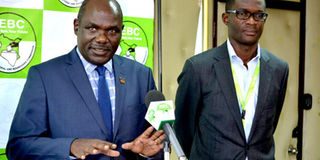Parallel tallying: Much ado about nothing

Independent Electoral and Boundaries Commission (IEBC) Chairman Wafula Chebukati (left) and CEO Ezra Chiloba at Anniversary Towers, Nairobi, on April 5, 2017 during the weekly media briefing on issues the August polls. PHOTO | SALATON NJAU | NATION MEDIA GROUP
What you need to know:
- The opposition has not indicated that they intend to carry out a “parallel election.”
- What should then worry any observer is the fact that the IEBC commissioners have such little confidence in their own processes and outcomes that they do not want any other person looking over their shoulders to check what they are doing.
Events on the national political scene leave one with no doubt at all that we are a country that loves drama. We often create drama for its own sake, even at the risk of jeopardising our own security and comfort. The latest episode concerns the so-called “parallel tallying”.
The opposition has recently announced plans to set up a centre to tally poll results as they are announced from each polling station during the forthcoming General Election.
They intend to collect results from all constituencies in the country, collate and aggregate them, and then compare them with the national results that will be released by the Independent Electoral and Boundaries Commission (IEBC).
The ruling coalition and the IEBC have come out strongly against this idea, arguing that it has the potential to cause chaos should there be a difference between the opposition results and the IEBC’s “official” results.
ISSUED STATEMENTS
They have issued statements purporting to demonstrate that this “parallel tallying” is unconstitutional and should not be allowed to happen. They cite sections of the Constitution that give the IEBC the sole authority to carry out an election and announce the results, and argue that any other individual or organisation purporting to take over this responsibility contravenes the Constitution.
Obviously, from the face of it, this is a mischievous misreading of the Constitution. The opposition has not indicated that they intend to carry out a “parallel election.”
They have in fact submitted to all the regulations set by the IEBC and other written law in order to be eligible to participate in the elections superintended over by the IEBC.
Had they intended to carry out their own election, they wouldn’t have spent so much time and resources complying with IEBC requirements. Their intention cannot therefore be dismissed as being unconstitutional unless there is more to it than has been openly disclosed.
STRONG PROTESTS
What then would be behind the strong protests from the government, and especially the IEBC? Their protests betray a certain fear that chaos may erupt should there be serious discrepancies in the election results, especially if they favour the ruling coalition and disadvantage the opposition.
What should then worry any observer is the fact that the IEBC commissioners have such little confidence in their own processes and outcomes that they do not want any other person looking over their shoulders to check what they are doing.
These loud protests suggest that the government and the IEBC know that the results may not pass the test of credibility, and they want to create a situation in which all of us will be commanded to only listen to the IEBC and nobody else in order to minimise conflict.
In the past elections, we have had situations in which even media stations had their own independent national tallies based on results announced at polling stations and collected by their own reporters on the ground.
RIGHT TO INFORMATION
This was never declared “unconstitutional” or illegal, because we have a right to information, especially if such information concerns activities carried out using public funds.
The government and IEBC would do well to heed the following admittedly unsolicited advice if they want to ensure that the election results are credible and easily accepted across the board.
Let them focus on the IEBC’s core business, which is to organise and run a well-oiled electoral machine with extremely transparent processes that can be counter-checked by anyone with an interest in the outcome.
Let them stop heightening tensions by engaging in needless altercations with politicians who are only too happy to demonstrate that the electoral body intends to rig the election against them.
Once they fix the systems, let them invite all citizens to maintain their own “parallel tallying centres” to monitor the results of the election, confident that should there be a discrepancy, it will not be as a result of errors on the part of the IEBC. This is the only way to eliminate suspicions and avoid post-election chaos due to disputed results.
The alternative behaviour entailing engaging in shouting matches with the opposition can only be counter-productive in the final analysis.
Lukoye Atwoli is Associate Professor and Dean, Moi University School of Medicine [email protected]





